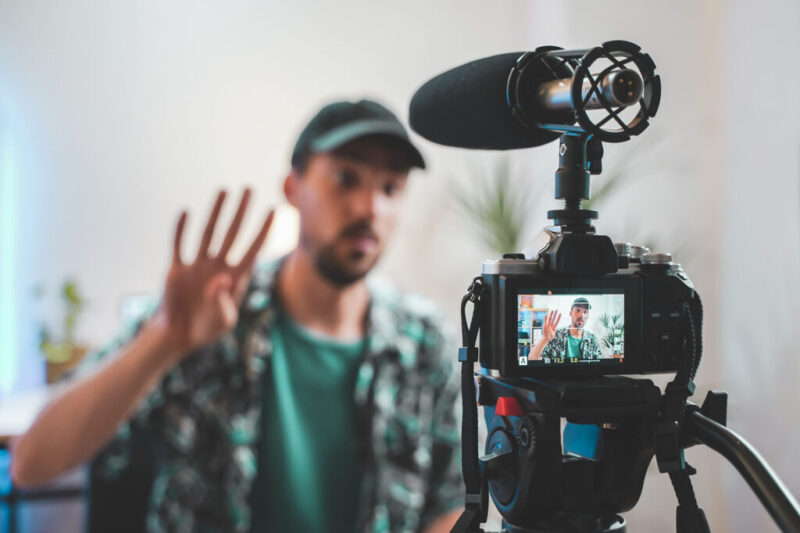The influencer industry is not free of scandals and controversies, especially since so much money is involved. However, France is more proactive in regulating this sector than its European counterparts. In a potential milestone, France is poised to become the first nation to establish legal definitions for influencers. They even introduced new legislation to curb product promotion and services, and the government wants to develop a regulatory framework. The proposed bill, supported by MPs Stéphane Vojetta and Arthur Delaporte, aims to revolutionize how influencers promote products and interact with their followers.
How did this Digital Revolution Start?

French celebrities and influencers face legal issues concerning their promotion of financial products and investments. Television personality Nabilla Benattia-Vergara was fined €20,000 for promoting Bitcoin to her Snapchat followers without disclosing her paid endorsement. Rapper Elie Yaffa, also known as Booba, accused influencer agent Magali Berdah of promoting questionable products. In addition, over 100 individuals filed a class-action lawsuit against French social media influencers for misleading them into financial losses on trading and NFT platforms.
Social media fraud does not only refer to what we see in the headlines. It also affects influencers who market various products, from Botox fillers to cryptocurrencies. Stéphane Vojetta, a member of France’s Assemblée Nationale, has witnessed the devastating impact of these scams on victims. They have suffered from medical malpractice, drop-shipping fraud, and cryptocurrency-related Ponzi schemes. Vojetta has held meetings with these victims to understand their plight better.
The issue of unregulated influencer marketing is a global concern, not just limited to France. Data Bridge Market Research shows that the influencer industry is projected to grow significantly to $69.92 billion by 2029. However, despite this rapid growth, there needs to be more consistent regulation across the industry.
Recently, the Securities and Exchange Commission in the U.S. took legal action against high-profile individuals, such as actress Lindsay Lohan and social media personality Jake Paul, for promoting cryptocurrencies unlawfully. Similarly, in the U.K., Parliament initiated an inquiry into influencer culture, which partly examined the lack of regulation in product endorsement. Catalina Goanta, an associate professor at Utrecht University focusing on digital society governance, notes that regulators worldwide are increasingly scrutinizing influencer marketing.
What does the New Law Mean for Influencers?

The proposed legislation aims to introduce strict regulations on influencer marketing. According to the new rules, influencers will not be allowed to endorse cosmetic surgeries, financial products and services (including cryptocurrencies), and imitation products. Furthermore, content creators will be required to disclose the use of filters on photos and videos for advertising purposes.
Furthermore, the legislation aims to define influencers as “legal entities or individuals who, for a fee, mobilize their notoriety to prompt services or goods online. The legislation has been extended to prohibit the promotion of products containing nicotine.
The Ministry of Economy has established a task force to detect violations in the field of commercial influencing. However, Professor Goanta warns that ensuring successful monitoring and enforcement of these measures may be difficult due to several factors. One of the significant hurdles is that the number of followers an influencer has is no longer the only criterion to determine their influence or outreach. You can have an influencer with a limited following (say 20,000 people) who can earn colossal amounts promoting untrue services or goods.
What Does It Mean Online Gambling Industry?
One of the industries that is coming under scrutiny for being promoted by influencers is the online casino industry. This multi-million dollar sector extensively uses influencer and social media marketing to expand its business. Influencers who promote online gambling platforms run affiliate businesses and write sponsored blogs, which can make a sizable income. Dan Bilzerian, Joe Griffith, and Professor Imedi Flynn are a few of the prominent figures in the online gambling industry. These influencers frequently share their experiences with online gambling, promote various products, and provide guidance and ideas.
With the proposed new regulations, any promotions related to gambling or betting at online casinos like those found at jouerenlignefr.org, an informative banner highlighting the associated risks with gambling, must now be included in influencers’ content on gambling. It also addresses the issue of sports betting and gambling by restricting influencers from endorsing subscriptions to sports forecasting services and limiting the promotion of monetary games.
The promotion of monetary games, such as online slots, is only allowed on platforms with technical measures to restrict minors’ access. Those who fail to comply with these regulations may face severe consequences, such as up to two years in prison and a fine of €300,000.
Similar Movements in the EU

The European Union’s Digital Service Act (DSA), implemented last November, is pivotal in securing platform compliance in France. The DSA encompasses a broad range of directives, compelling digital platforms to implement safeguards for consumers against problems like hate speech, online harassment, and defective products on online marketplaces.
While the Act doesn’t specifically address influencer marketing, Vojetta indicates that the French government intends to “replicate these measures in French law.” This replication aims to enforce similar regulations for violations related to commercial influencing.
Furthermore, the E.U. has strict rules against misleading commercial practices since 2005. It’s called the “E.U. Directive on unfair commercial practices,” but regulation was never clearly defined. According to analysts, the effort to regulate and implement such a directive is a “creative procedural dance” because of several interpretation issues.
With the E.U. directive in a stalemate, nations try to take matters into their own hands. Like France’s efforts, Norway passed a law in 2021 that mandates influencers to disclose whether their posted images have been edited, especially when endorsing a product or service.
The United Kingdom is another country that joined the movement. The authorities here investigated influencer culture and recommended the creation of a code of conduct for influencer marketing. They also recommended a thorough study of the influencer ecosystem within the UK. This study and all the procedures aim to establish payment standards and practice guidelines.
Final Words
Like any other industry, influencer marketing should be regulated, especially if it can lead to people buying ineffective goods or services. France’s steps toward this status are historic, and having a clear framework will only help the industry develop and weed out the ones cutting corners.
However, everyone saw how difficult “policing the internet” can get. The recent examples of iGaming regulators trying to keep unlicensed operators out exemplify that direction. So, for these efforts to be successful, the authorities must work closely with the companies using influencer marketing and the influencers themselves.

